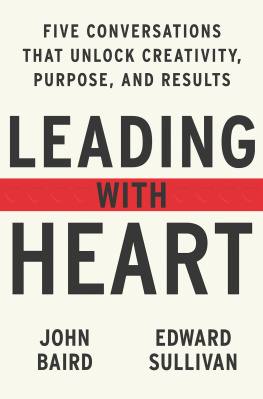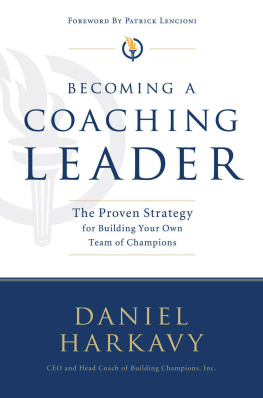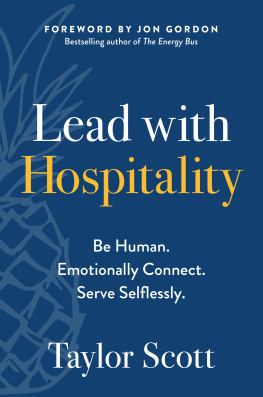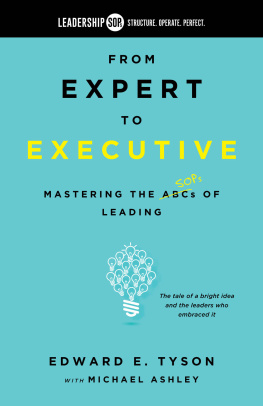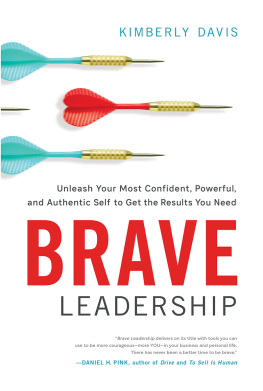Contents
Guide
This book is dedicated to the brave souls who began showing up at work as they really are, with authenticity, curiosity, and open hearts, long before it was on trend or even safe to do so. You made the conversations we humbly attempt to capture in these pages possible.
And to our clients who have allowed us to witness their genius, courage, and growth over the last twenty-plus years. You are the leaders of our today and the builders of our tomorrow.
Contents
It is only with the heart that one can see rightly; what is essential is invisible to the eye.
ANTOINE DE SAINT-EXUPRY, THE LITTLE PRINCE
T ucked between the Old Town Bar and ABC Kitchen in New Yorks Flatiron District is a nondescript white door marked with the number 37. When you ring the bell, the door buzzes open, and a waiting elevator takes you up to the fourth floor. Youre now inside the Hivea stunning loft office space with soaring ceilings, soothing pastel colors, dozens of plants, and roughly a hundred humans buzzing around, ranging in age from twenty-two to sixty-two.
Some employees clack away at their computers. Others laugh and chat loudlythe Hive can get pretty noisy. Just outside the kitchen a few people attend to a huge jigsaw puzzle. And beside the floor-to-ceiling windows still other members of the Hive perch at one of the drafting tables surrounded by stacks of clothing samplessocks, underwear, T-shirts.
Plush fabrics. Happy people. Cold brew and kombucha on tap. You probably have a life outside the Hive, but you could just as easily set up shop here forever.
In New York, its often the most unassuming doors that lead to the most spectacular interiors, and the guy youre here to meet falls into that category, as well. Judging by his loose-fitting sweatshirt, khaki pants, and comfy sneakers, you might mistake Dave Heath for a coder or a designer. Anything but the CEO of a multimillion-dollar apparel brand.
Daves company, Bombas, started out selling socks online almost ten years ago. Today, along with socks, they have a booming business in T-shirts and underwear. You might be thinking, Millions of dollars? Thats a lot of socks. Yes, it is. But Dave puts it another way: We are cornering the market on comfort. And if that werent enough, Bombas gives away one item to a homeless shelter for every one they sell.
Watching Dave move through the Hive is a little bit like watching a dedicated gardener navigating a greenhouse full of roses. A gardener sees and studies every flower, taking in and appreciating their unique qualities. This damask rose might need more water, that Juliet rose more light, and the batch of Black Beauties a touch more fertilizer. Just as a gardener makes sure every flower has exactly what it needs to thrive, Dave does the same with each and every team member so that they can bloom more fully.
Everyone he encounters seems genuinely thrilled to stop and chat. No one looks intimidated. No one gathers in a tense semicircle, competing for his attention. More importantly, Dave appears genuinely interested in all of them. As he glides through the room, he seems to trail some kind of CEO pixie dust that leaves the people in his wake feeling validated, motivated, and, if possible, even more committed to the company than they were before.
Dave pauses to sprinkle some of that pixie dust on his head of marketing, Kate Huyett. Kate is a former Goldman Sachs investment banker turned digital advertising guru. Years earlier, when she left Wall Street to put her quantitative mind to work on marketing analytics, Dave saw something special in her. Kate is reserved, but deeply insightful. When she speaks, everyone leans in to hear whats on her mind.
Whats the best way to handle a situation with an employee who has an increasingly negative attitude? she asks Dave.
He fields her question with some of his own. Well, what does that employee really need right now? Whats behind their negative attitude? Are they not feeling heard? Do you think theyre in the right role?
Its typical Dave. Instead of jumping in with the answers, he always looks to uncover the subtext. Hes eternally curious about what is going unsaid and responds with a series of targeted, insightful questions. Questions that invite conversation.
- What need isnt being met?
- What fear holds that person back?
- What is really driving that person?
- What gift is going unexpressed?
- What is that persons real purpose?
Its this supernatural curiosity and empathy that his team responds to, and its at least partly responsible for the loyalty and commitment Bombas employees feel. Not only does Dave do this for his own team, but he also coaches his executives to use the same methods with their direct reports.
In a short period Bombas has become a breakout success in the direct-to-consumer category, while many of its peers have made big splashes, only to dry up later. Bombas has done it while winning numerous Best Place to Work accolades and chalking up some of the lowest employee turnover in the industry.
We believe this is because CEO Dave Heath leads with heart.
Lets contrast Dave with another of our clients. Since its not the most flattering story, well call him Joe, out of respect and confidentiality.
When we met him, Joe ran a small public health-care company. Looking at Joe, talking to Joe, spending time with Joe, youd think this guy had all the trappings of a successful CEO.
Stanford degree. Professional presentation. Deep domain expertise. Superconnected network. Process-oriented mindset. The determination and grit of a Scottish border collie.
Name a classic skill or trait of a successful leader that youd find in all the business booksJoe had it. And operationally, Joe had implemented many of the latest best practices for organizing the team and their time. They had stand-ups and sprints. They had values that included words like candor, empower, and celebrate. They even had kombucha on tap.
But after some early success bringing a few new treatments for cancer and Parkinsons to market, Joes company was going through a rough patch. Morale was at an all-time low, turnover was hovering at 50 percent, and most employees who did stick around were just calling it in.
Employees felt frustrated. Few felt seen or empowered, in their words. Instead of working collaboratively, most sat alone quietly at their desks, writing long emails or swapping rapid-fire Slack messages with colleagues, some of whom were sitting three feet away. Meetings often ended without clear decisions or to-dos. Checked-out team members took two-hour lunches. And as a result, sales continued to dwindle.
Joe called us in to help with the morale and performance issue. He was frustrated by having to do everything. According to Joe, no one saw the business the way he did. No one had an eye for quality like he did. No matter how much time his team put into a press release, Joe had to rewrite it. Basically, no matter what happened, Joe found a flaw in it.
When we talked to his team, it was clear how dedicated they were to the companys vision and to their patients. Many of them got emotional when they talked about their sense of service and purpose. Some had family members who had died of cancer. Others had parents or grandparents with Parkinsons.
They also shared that Joe was one of the smartest and most charismatic people theyd ever met (literally, he was!), but he also made sure everyone knew it. Instead of showing any curiosity about his teamwhat they were good at, what motivated them, what they needed to flourishand showing that he cared about them as people, Joe simply went around thinking big thoughts and barking orders.

